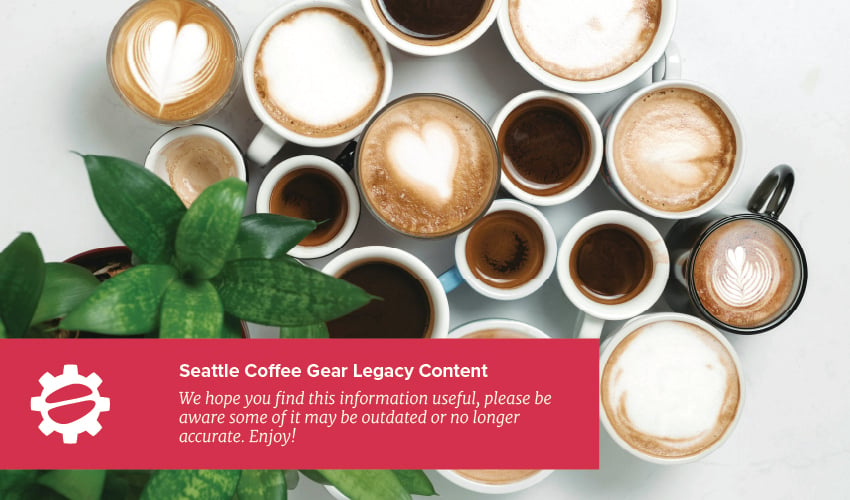For Richard Branson, an essential criteria for his business success, his compass, is the idea of 'fun'. He has infused it into all the brands he has founded, promoted and seen flourish -- and it's arguable that the simplicity of the idea in and of itself is what has made the brands he's launched gain traction and longevity in their respective markets. Sure, when we get too complicated, we lose sight of what we're trying to achieve and run the risk of confusing the people with whom we're trying to communicate. While we absolutely cherish and extol the virtues of fun, when we thought about boiling down what we do at Seattle Coffee Gear to one simple, essential idea, we settled on another word: Knowledge. It's in this blog we write, in the videos we produce, in our product descriptions, in the customer service we give on the phone and in the store -- we have even dedicated a whole website to providing resources and knowledge to folks as they navigate the sometimes far-too-complex world of choosing their coffee related gear. While we have fun with this and it's important to us to communicate the elemental joy to be found in the experimentation with, creation and drinking of coffee, teaching people, being honest and giving them the information they need to make the right choice for them is our ultimate ideal. From a pure data perspective, this industry is really young in the United States: In Europe, the average household spends around $800 on their home coffee machine, while we spend an average of $80 in the US -- obviously, there is significant room for growth and a big part of that growth is education. One of the most common refrains we hear from customers is that they want simple and concrete information, they're confused by all the options, which is the best choice, etc. What these people are looking for is honesty, facts, advice and candid experience. And that's what we give them. But that's not always perceived as a positive move in our industry. For a long time, there has been a culture of limited information, building sales at the expense of support and of attempting to stranglehold supply in order to control the availability of specific machines in the marketplace. What this means for customers, at the end of the day, is that instead of being able to select the best machine for them and be relatively assured that said machine has longevity, reliable build quality and a service and support story that means they can keep this arguably high priced appliance around for awhile, they're offered limited options from the beginning, and once they've purchased they have to contend with the business practices of the only company who supplies it because they're the only game in town. This style of business supports mediocrity, allows it to flourish and, in the end, is not sustainable. It says that, rather than improve the business to compete on a variety of fronts, the only way it can compete is to be the exclusive supplier of something. So if your item is what someone wants, specifically, they have no choice but to deal with you. Sure, there are a lot of different business models out there, but this style is ignorantly disrespectful to the customer's needs at best and downright anti-competitive at worst. But it's not just the home espresso industry that this applies to; this type of behavior goes on all over the business world and it has contributed to a growing clamor of distrust between buyer and seller. Things are made cheaply to maximize margins, organizations manage around customer dissatisfaction instead of working to eliminate it where possible and they focus on bringing in new customers more than keeping their current customers satisfied. What this breeds is a lack of accountability on both sides of the situation -- and that results in a lot of frustration for everyone involved. Ultimately, it's about being more responsible and balanced in all that we do -- and none of the players in the equation are exempt. Business patterns, supply chain models and how individuals approach buying things are slowly evolving to reflect the requirements of a changing world, and what we're experiencing right now is the flux that future generations will look back on as the bad old days. Seattle Coffee Gear is responsible for providing good information to potential customers, communicating recommendations and suggestions as heard from customers or based on our own experiences back to the manufacturers so that the build quality and component longevity (ideally) improves, supporting customers after they've purchased by helping them get the most out of their machine through education and repair and to make sure that, whenever we sell a machine, it's in good faith that we were able to match a customer's needs with the best available machine for them. Sure, there's always room for improvement and we make mistakes -- after all, we are a composite of several humans that are far from perfect -- but this is our ideal, what we strive for and why our company exists. We are lucky enough to work with other suppliers and retailers in this business that also ascribe to this perspective, and the industry, as a whole, is evolving to one based on respect for the customer and not just their pocketbook. Thankfully, there is a swelling movement toward customer education, accountable support, improving build quality and offering customers the choice and unbiased advice in order for them to engage in the purchase contract wholeheartedly. Yeah, there are holdouts -- there always are -- and they'll either change with the times or disappear in them.
Knowledge IS Power: Balance & Accountability in Home Espresso
coffee
·
espresso machine
·
espresso machines
·
Legacy
·
news
·
reviews


